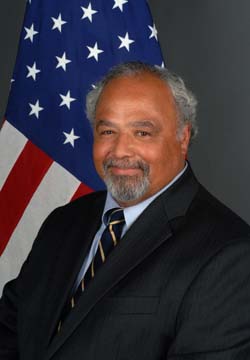 U.S. Global AIDS Coordinator Dr. Eric Goosby delivered opening remarks at amfAR’s meeting on implementation science for PWID.
U.S. Global AIDS Coordinator Dr. Eric Goosby delivered opening remarks at amfAR’s meeting on implementation science for PWID.At the 2012 International AIDS Conference, U.S. Secretary of State Hillary Rodham Clinton announced an investment of $15 million to support implementation science focused on key populations, which explores the challenges of translating clinical research findings to real-world settings. To inform this funding opportunity, amfAR convened a group of international experts to discuss an implementation science research agenda for people who inject drugs (PWID). This meeting, held June 4–5 in Washington D.C., followed up on a similar meeting convened in January focused on gay men, men who have sex with men and transgender individuals (GMT).
“Harm reduction, including syringe exchange, is one of the most effective HIV prevention tools available today. However, access to these services and adherence to them remains low throughout the world,” said Owen Ryan, amfAR’s deputy director of public policy and meeting organizer. “In addition to discussing barriers such as pervasive discrimination and criminalization, we wanted to explore how the latest science on HIV prevention for PWID could have a greater impact on these men and women.”
Representatives of nongovernmental organizations and field staff from select countries, as well as OGAC staff and external experts, were present to offer their perspectives and experience regarding the meeting’s three major themes: needle syringe exchange and low dead space syringes (LDSS); medication assisted therapy; and antiretroviral therapy for PWID.
Attendees were then tasked with summarizing and synthesizing evidence-based research on core interventions as they related to the three themes, discussing actionable strategies to overcome policy and program barriers, and developing an implementation science agenda for PWID focusing on countries that receive PEPFAR funding.
amfAR’s public policy office is currently in the process of using the information obtained during the meeting to prepare a document on Implementation Science for Key Populations for future publication.